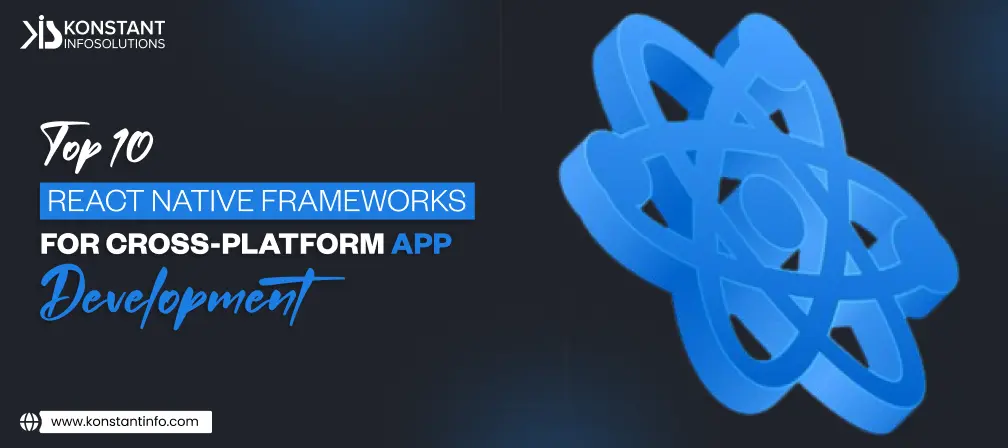
Introduced in 2015, React Native is the technology behind popular apps such as Facebook, Instagram, WhatsApp, Uber Eats, Walmart, and many others.
React Native enables the developers to write code once, and run it anywhere, thus simplifying cross-platform app development.
42% of software developers rely on React Native apps to create Android, and iOS that inherit the capabilities of the native application. (Statista)
React Native has become increasingly popular among mobile app developers, resulting in many React Native frameworks designed to simplify the process of building cross-platform applications.
Here in this blog, we will talk about the best React Native frameworks that you can choose for the design & development of your next mobile app development project.
So, let’s get started.
Put simply,
React Native is a JavaScript-based framework that is used to create natively-rendered apps for Android and iOS utilizing the majority of a similar codebase.
The framework is based on React, a JavaScript library introduced by Facebook for building user interfaces.
React Native is primarily designed to solve the problem of maintaining two code bases for a similar mobile application. Initially, it was used only for mobile app development, but now, it has evolved into a number of different applications such as Windows, tvOS, Android TV, and Web Apps.
The primitives in React render to native UI, which means that your app uses the native platform APIs just like any other application. With React Native, developers are freed from having to keep track of what logic an app needs to execute an action. They simply have to write the code and their desired outcomes will be attained.
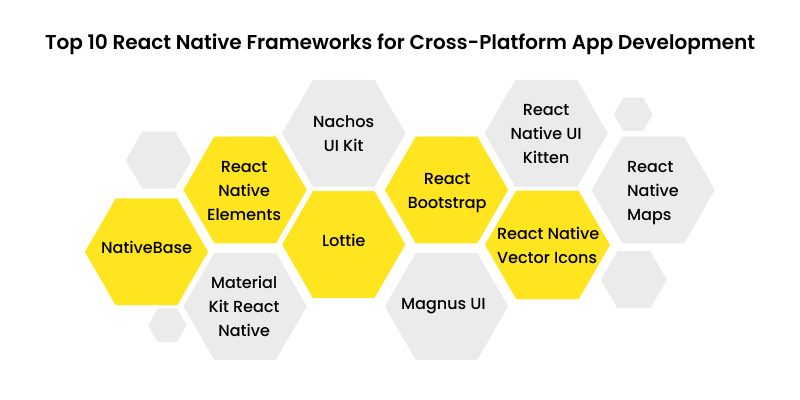
Best React Native frameworks streamline the process of creating stable, scalable, and high-performing cross-platforms. Let’s walk through our curated list of React Native frameworks:
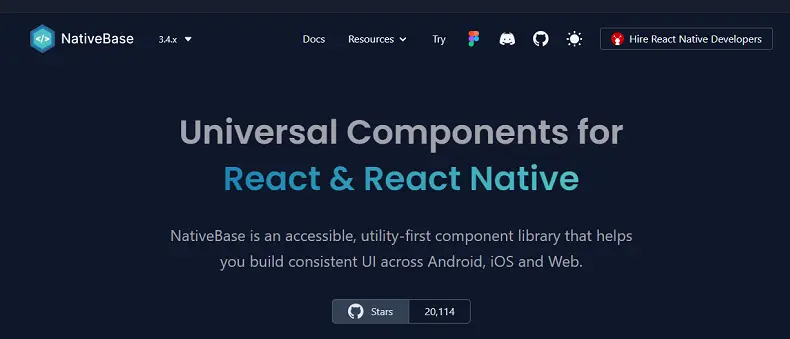
NativeBase is a mobile-first React Native component library designed to help developers build pixel-perfect, cross-platform UIs for Android, iOS, and the Web.
This open-source framework is highly themeable, enabling the developers to create UI components that advocate their goals. Furthermore, NativeBase offers a rich collection of components to make sure developers’ imaginations become a reality seamlessly.
The most significant benefit of React Native lies in its ability to build responsive UI. As an alternative to developers having to add responsiveness manually, the framework supplies the objects and array to make responsive styles more valuable.
Highlights |
| GitHub Stars: 20.1k |
| Integrated with React ARIA, NativeBase facilitate the faster creation of an accessible design system |
| A collection of 40 components to make UI’s easier to build |
| Highly Themeable to make sure every goal of the developers transcends into the reality |
| Optimized to deliver valuable results in both light and dark UI modes |
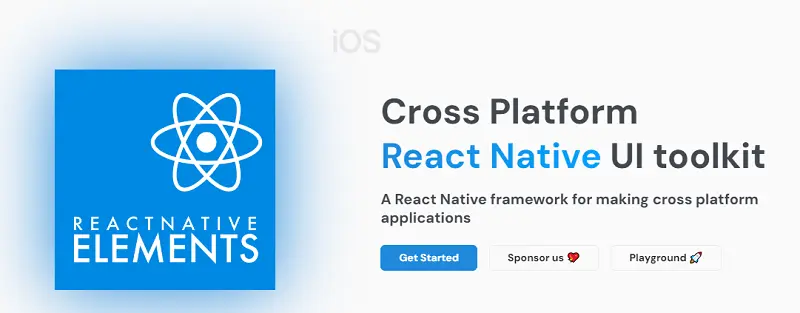
React Native Elements is a community-driven cross-platform React Native UI toolkit. It is built completely in TypeScript which makes your development journey a lot easier. The majority of the UI creation hurdle is reduced with React Native elements as it offers the ready-made UI kit that can be integrated with your project to give a consistent look and feel across multiple platforms.
All the components of React Native are highly customizable, meaning developers can steer the UI creation just the way they want.
Highlights |
| GitHub stars: 24.8k |
| All-in-one UI toolkit for creating cross-platform applications |
| Consistent look and feel across all platforms |
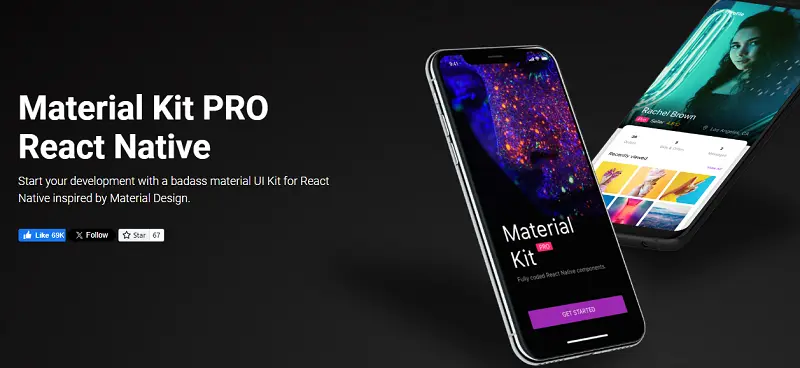
Built over the Galio.io, Material Kit is a fully coded app template that allows you to create beautiful mobile applications. Using Google’s material design guidelines, all components of the library have been redesigned to be easier to use and more minimalistic.
Material Kit comes with the necessary documentation to ensure that React Native developers can take full advantage of its potential.
Highlights |
| GitHub Stars: 577 |
| Fully coded templates built over Galio.io |
| Follow Google’s Material Design |
| 200+ fully coded variations of components |
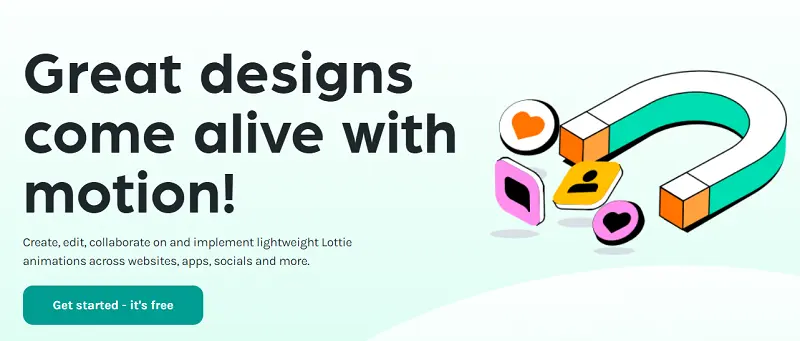
Lottie is an open-source animation library that allows effect animation to be rendered in real-time, making animations as easy to integrate into mobile applications as static images.
This animation library is compatible to work with Android, iOS, and the web to make beautiful animations. Lottie was initially introduced by Airbnb to seamlessly integrate the complex animations in their Android, iOS, and React Native to deliver a visually rich experience to its users.
Highlights |
| GitHub Stars: 34.8K |
| Adobe After Effect animations exported as JSON |
| Shipping beautiful animations without creating them from scratch |
| Codegen animations are supported |
| Dynamic loading of JSON strings at runtime |
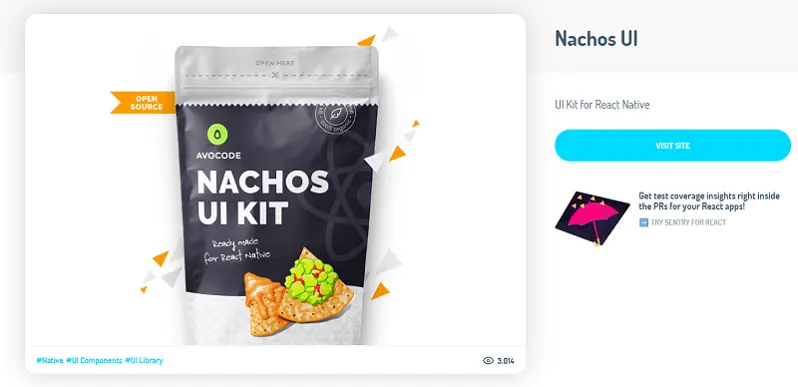
Nachos UI kit is an open-source React Native UI framework for assembling customizable UI components.
With Nachos UI React Native framework the process of creating becomes painless. Developers can import any of the pre-style inputs from one to another. Import the component and customize the component to suit your project needs.
Highlights |
| GitHub stars: 2.1K |
| 30+ ready-made components |
| Fully featured tool to import any of the pre-style inputs |
| Open-source and community-driven |
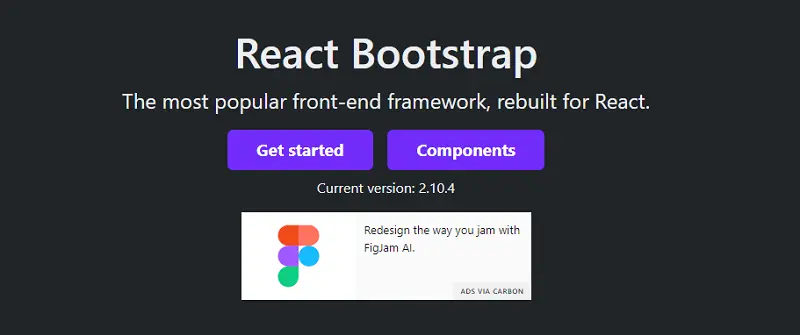
React Bootstrap is a React Native CSS framework that is compatible with several versions of Bootstrap. It replaces Bootstrap JavaScript, and every component of this React UI library is built from scratch to ensure their best compatibility With React without the involvement of JQuery.
React Bootstrap provides developers with complete control over the look and feel of the user interface.
Highlights |
| GitHub stars: 22.3K |
| Accessibility to thousands of Bootstrap themes |
| Reduces the dependency on JQuery |
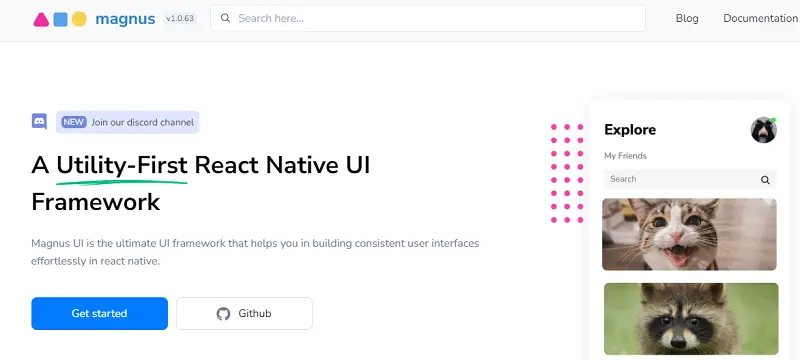
Magnus UI is yet another React Native UI framework that enables developers to build a consistent user experience across multiple devices effortlessly. This utility-first framework comes with a polished set of React Native components that can be easily customizable to make sure your preferred design requirements are met.
A powerful feature of Magnus UI is the ability to import themes that can easily be customized.
Highlights |
| GitHub stars: 1.2K |
| Based on Atomic design methodology |
| 25+ polished React Native components |
| Thousands of icons availability to help developers reach their creativity to the fullest |
| Theme customization |
![]()
React Native Vector Icons is the most popular React Native framework that offers developers access to free-to-use custom icons. Vector icons offer full customization, whether it is altering the size or color, or supporting multiple styling options.
Highlights |
| GitHub stars: 17.3K |
| Customizable vectors |
| Multi-style font adaptability |
| Animations |
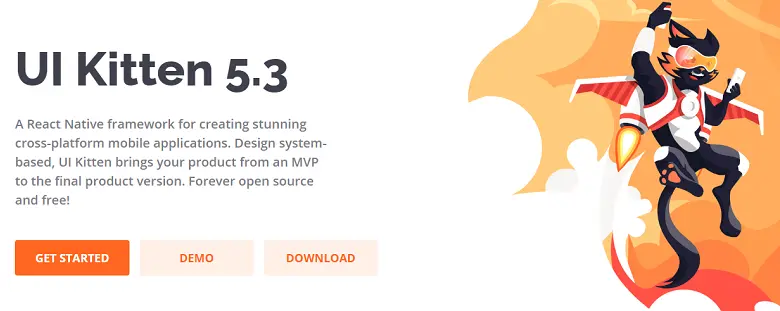
UI Kitten is the most renowned React Native framework for cross-platform app development. From MVP to production-ready software, this open-source and free framework can assist developers throughout the entire development process.
The most distinct feature of this React Native UI framework is that it enables the developers to customize the theme in the run time without reloading the application. A comprehensive guide is included with the framework to ensure developers are able to take advantage of all of its features.
Highlights |
| GitHub stars: 10.3K |
| Followed by Eva Design System |
| 100% free and open-source |
| Full documentation with examples |
| 480+ beautiful open-source icons |
React Native Maps is an underlying component system for enabling React Native app developers to integrate the Map component in Android and iOS apps.
In addition to integrating the Map, React Native maps enable the developers to customize the map style in the way they want. The developers can even utilize the animated APIs to control the map’s center and zoom.
Highlights |
| GitHub stars: 14.9K |
| Maps SDK for Android and iOS |
| Customizing the map style |
| Changing the style of the map |
| Animated Web APIs |
| Image-based markers |
React Native is the most preferred choice for developers to build cross-platform mobile applications. The capabilities of React Native will be enhanced by these React Native frameworks to provide developers with a more productive and feature-rich development experience.
A professional can help your business leverage these frameworks to achieve greater success with your React Native app development project. Since its founding in 2003, Konstant Infosolutions has become known as the best app development company. Driven by rich expertise in cross-platform app development, we can steer your project from initial planning to the final deployment of the product version.
1. What is the React Native UI component?
React Native UI components are widely used in the design of mobile applications as they are isolated from other components and can be reused multiple times, such as buttons.
2. When are the benefits of React Native UI frameworks?
React Native UI components comes with several benefits as mentioned below:
3. How to choose the best React Native frameworks?
There are various factors go into consideration while choosing the best React Native framework as mentioned below:
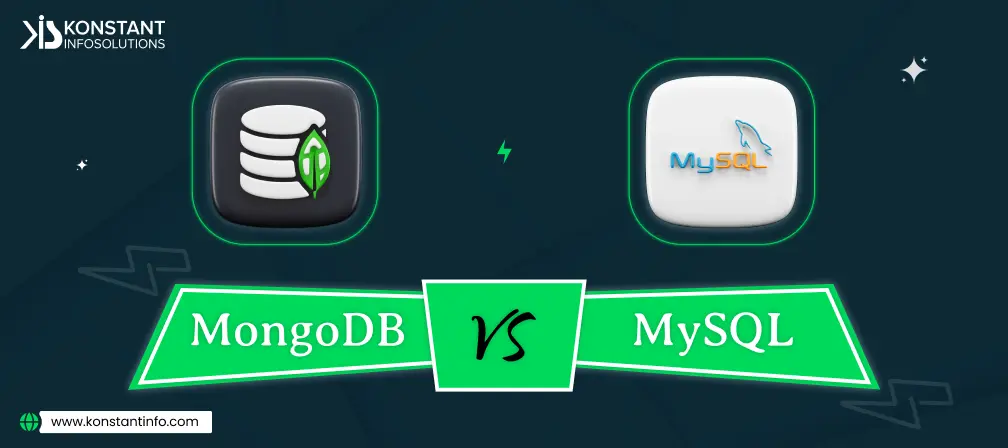


Vipin Jain is the Co-Founder and CEO at Konstant Infosolutions and is in charge of marketing, project management, administration and R&D at the company. With his marketing background, Vipin Jain has developed and honed the company’s vision, corporate structure & initiatives and its goals, and brought the company into the current era of success.
Or send us an email at: [email protected]